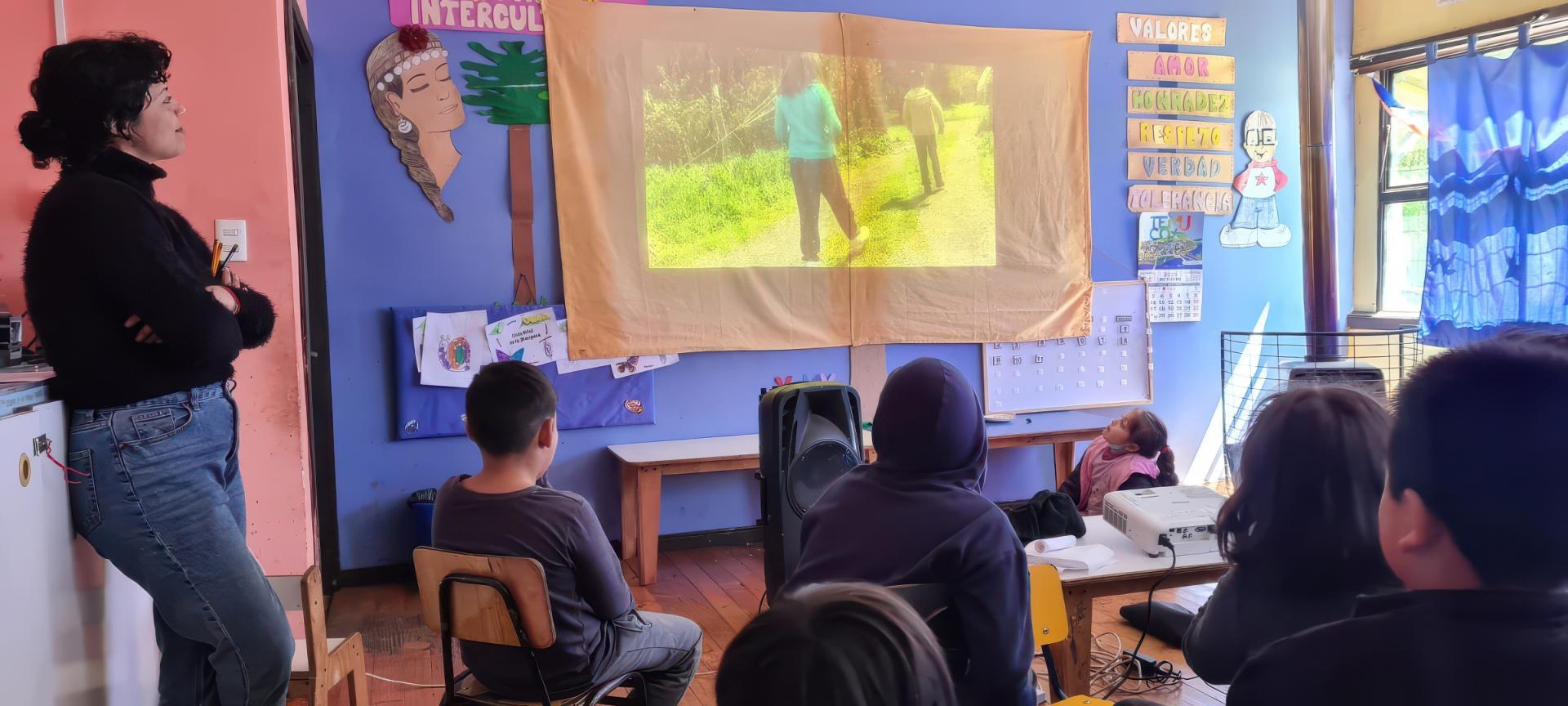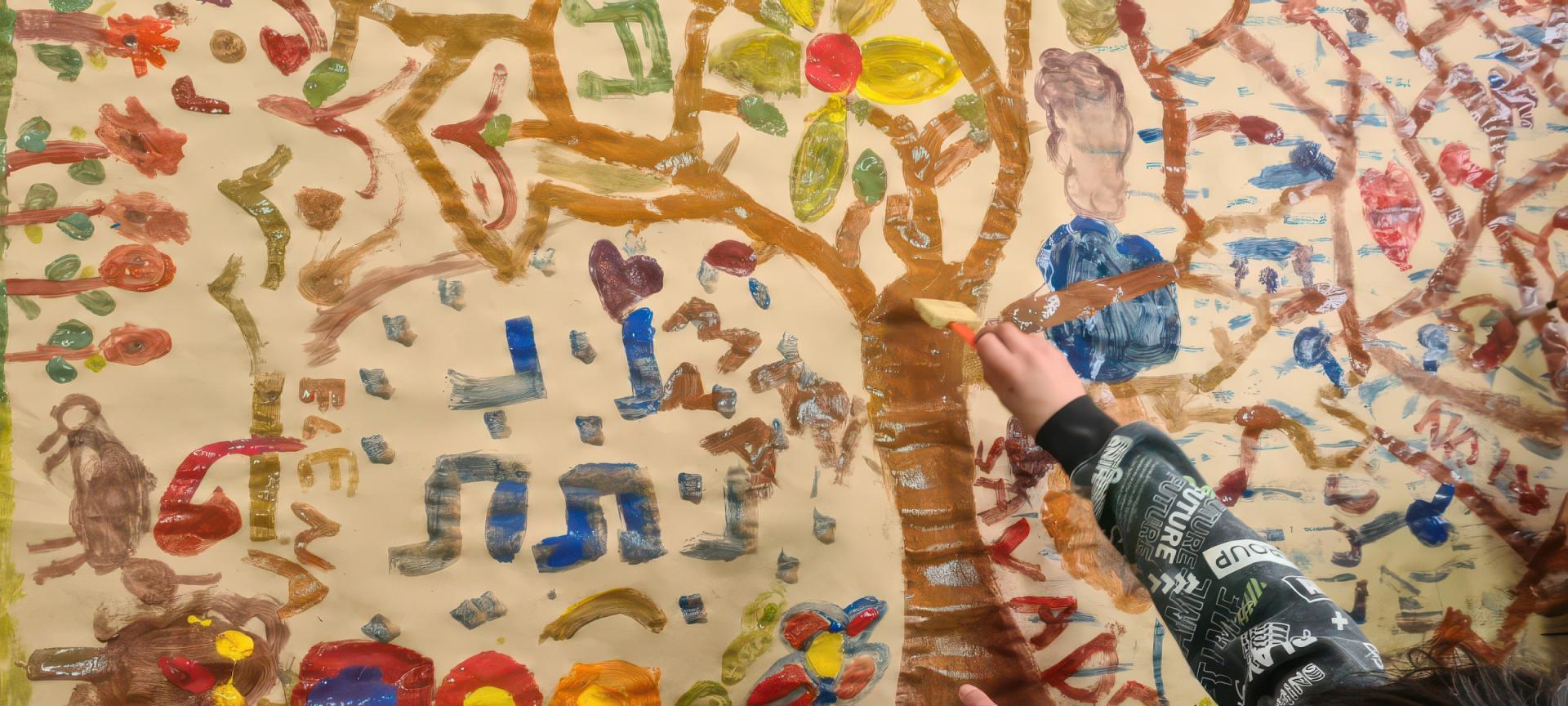
Mi nombre es Eli Huehuentru. Soy un artista Mapuche de 28 años, parte de la comunidad J.H. Xomio, Padre Las Casas (PLC), Gulumapu-Wallmapu, territorio mapuche en resistencia en Chile. Mi relación con la música comenzó a los nueve años cuando tuve un violín que llegó a mis manos a través de un proyecto de orquesta social llamado FOJI en el año 2004 en la comunidad PLC. Allí aprendí a tocar este instrumento y a compartir música con otros niños en la orquesta infantil de PLC. A los 12 años, empecé a dar talleres de violín en una escuela rural de una comunidad mapuche vecina, donde trabajé con un pequeño grupo de niños menores y también de mi edad. Las zonas rurales no tienen el mismo acceso a la educación artística ni a espacios donde se fomente la creatividad que las zonas urbanas, y comprendí que tenía la posibilidad de compartir lo que había aprendido con mis compañeros.
A medida que fui creciendo, participé en diferentes espacios culturales. La música me dio la oportunidad de viajar dentro y fuera del país, pero cada año la idea era regresar a las escuelas de las comunidades para compartir con nuestra gente algo de lo aprendido o un poco de la música. Estos actos me animaron a reflexionar sobre la responsabilidad que teníamos como artistas de dar cabida a las visiones y sentimientos que siempre han estado presentes en nuestras comunidades, pero que rara vez se expresaban en las aulas, los escenarios, los teatros, las galerías u otros ámbitos públicos.
El proyecto “Talleres Creativos en Escuelas Rurales” nació como una iniciativa apoyada por la Beca para Jóvenes Indígenas de Cultural Survival, gracias a la colaboración de Pipi Villadangos e Isaak Brand. Villadangos es un bailarín y artista transdisciplinario de 25 años de la provincia de Buenos Aires que vivió dos años en Gulumapu. Para él, enseñar implica escuchar y aprender, y tal vez inventar algo nuevo juntos. Ha estudiado y trabajado con el cuerpo desde los 11 años a través de la danza, la anatomía y la actuación. A los 19 años dejó el continente para seguir buscando. Brand es artista visual, cineasta, actor y educador social con formación especial en metodologías artísticas para la intervención psicosocial en contextos de vulnerabilidad sociocultural-socioeconómica. Es co-creador del proyecto de artes visuales y de actuación INCHIW, y parte del espacio de creación y cultura contemporánea Temuco.
El desarrollo de nuestro proyecto propuso ciclos de talleres creativos en tres escuelas rurales de Gulumapu, Wallmapu. La mayoría de los grupos estaban integrados, por lo que nos enfrentamos al reto de generar materiales apropiados para niños de 6 a 13 años. Los talleres se celebraron semanalmente durante un mes e incluyeron exploraciones en sonido, artes visuales, movimiento y audiovisuales, culminando en una celebración. Durante estos días en las escuelas, comprendimos la necesidad de establecer conexiones con los participantes. En particular, buscamos actividades en las que los niños pudieran expresar su creatividad al tiempo que daban voz a sus experiencias cotidianas. A medida que avanzaban los talleres, se les invitaba continuamente a expresar sus ideas, pensamientos y sentimientos.
Una de las reflexiones que acompañó este proceso para nosotros como facilitadores del taller fue la del espacio, o la falta de espacio, que puede existir en las infancias mapuche, producto del colonialismo, racismo y capitalismo en el territorio impuesto llamado Chile. Desde este lugar de reconocimiento, buscamos ofrecer o invitar a una mayor participación a ciertos niños en los que notamos comportamientos más afectados por este racismo internalizado. Al hacernos más presentes en las escuelas, notamos cómo el acercamiento a nuestra visión como pueblo mapuche les daba a los niños más autonomía y poder para enfrentar sus experiencias. Esto se pudo apreciar a través de ciertas diferencias que surgieron entre las escuelas y si sus fuentes de aprendizaje estaban más o menos, vinculadas a la cultura y las artes.
Decidimos utilizar una metodología que englobara el juego, la creación y la relajación, en la que los niños pudieran introducirse a una disciplina artística viendo vídeos, escuchando música o viendo actuaciones de danza en vivo; para presentarles una experiencia en la que pudieran involucrar sus sentidos y reflexionar sobre ella. Todo el material de las sesiones se grababa y archivaba en vídeo o en fotos, y al día siguiente los niños podían verse a sí mismos realizando esa disciplina artística y ampliando su sentido de la posibilidad al verse en una nueva acción. Los archivos audiovisuales fueron creados totalmente por los niños en los talleres como entrevistas que ellos mismos guiaban, narraban y grababan, rotando los papeles para vivir todas las actividades.

Alumnos en la proyección de sus proyectos audiovisuales creados en el taller organizado por Eli Huehuentru
Fue conmovedor para nosotros ver que, en muchos casos, estas actividades eran totalmente nuevas para los niños y pudieron haber plantado semillas de aspiración e interés en algunos de los alumnos. Vemos estos casos como una fuerza motriz para abrir en los niños la idea de lo que es posible para ellos en el presente y en el futuro. Este fue un tema de reflexión en la clausura de los talleres, con el propósito de animar a los niños a imaginar y creer en tantas posibilidades como deseen.
La educación autónoma de los Pueblos Indígenas es una base fundamental para la construcción de la identidad de niños y jóvenes. Su sentido de identidad se fortalece en la sabiduría, las historias y las experiencias vividas en el hogar, pero en muchos casos, a los jóvenes se les niega esta forma de educación. Las experiencias creativas que compartimos con los alumnos de las tres escuelas mapuches que visitamos buscaban integrar el ciclo de aprendizaje con la cultura única del territorio. Invitamos a los niños a darse gusto en la curiosidad de la infancia para cultivar el aprecio, el interés y el apego por las formas mapuches de percibir el mundo, de tal manera que incluyeran las nociones de identidad y visión ancestral que cada Nación valora al vivir en relación con su territorio.

Pintura colaborativa de los alumnos en el taller organizado por Eli Huehuentru
Nuestro equipo de profesores consiguió exitosamente establecer una relación no jerárquica con los niños; nos veíamos más como acompañantes o moderadores de sus experiencias. Todas las actividades propuestas se plantearon de forma que toda la exploración, los temas, el desarrollo y los contenidos fueran realizados por los niños. El conocimiento se transmitía desde nuestras diversas experiencias, fomentando la inclusión, el respeto y el cuidado. Dimos especial importancia al proceso, aceptando el producto final sin mayores exigencias. La creación artística fue presentada y ofrecida a los niños como un medio de expresión disponible a sus intereses, basada en la observación y expresión en su vida cotidiana, por el respeto y la felicidad de la infancia mapuche y por la resistencia territorial de los Pueblos ancestrales. ¡Wallmapu Libre!
-- Eli Wewentxu Huehuentru (Mapuche) es un joven becario de Cultural Survival.
Foto de portada: alumnos escribiendo en uno de los talleres creativos organizados por Eli Huehuentru.
